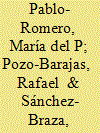|
|
|
Sort Order |
|
|
|
Items / Page
|
|
|
|
|
|
|
| Srl | Item |
| 1 |
ID:
149943


|
|
|
|
|
| Summary/Abstract |
The Covenant of Mayors (CM) is an initiative by which towns, cities and regions voluntarily commit to reduce their CO2 emissions beyond the European Union climate targets, through policies promoting energy saving and renewable energy. The aim of this paper is to analyze whether joining the CM is reducing municipalities' electricity consumption, and therefore their emissions. For this purpose, the evolution of total, household and public administration electricity consumption from 2001 to 2012 is analyzed by using panel data econometric techniques. This analysis is made for municipalities in Andalusia, the region of Spain with more signatories. Obtained results show that the CM is having a positive effect on the electricity consumption reductions, since the municipalities have greater rates of reduction of electricity consumption after signing the CM. Therefore, it may be considered appropriate to promote policies which incentivize the municipalities to join the CM and develop their action plans, as this can reduce their electricity consumption.
|
|
|
|
|
|
|
|
|
|
|
|
|
|
|
|
| 2 |
ID:
105799


|
|
|
|
|
| Publication |
2011.
|
| Summary/Abstract |
In addition to public policies aimed at improving the energy efficiency of buildings, EU authorities have also promoted the use of Renewable Energy Sources for heating and cooling uses (RES H&C). This paper analyses the main policy measures implemented in EU-27 countries up to 2009: i.e. subsidies, tax incentives, financial support and feed-in tariffs. Twenty-three Member States (MSs) have developed some of these policy measures.
The most widespread measure is the subsidy (22 MSs have implemented these) because from a political point of view, subsidies provide a straightforward approach to promote the use of RES H&C. Secondly, tax incentives have been used for reducing investment costs and making renewable energy profitable. Thirdly, financial incentives and feed-in tariffs have been used sparingly. While financial incentives might be used more extensively for promoting RES H&C if they are accompanied by other policy measures, feed-in tariffs are not likely to be implemented significantly in the future because this measure is not designed for household heat producers.
|
|
|
|
|
|
|
|
|
|
|
|
|
|
|
|
| 3 |
ID:
098653


|
|
|
|
|
| Publication |
2010.
|
| Summary/Abstract |
This paper provides a comprehensive overview of the main tax incentives used in the EU-27 member states (MSs) to promote green electricity. Sixteen MSs use tax incentives to promote green electricity simultaneously with other promotion measures, especially quota obligations and price regulation. However, not all available technologies are promoted. For example, six MSs (Germany, Romania, Slovak Republic, Denmark, Sweden and Poland) have included an exemption on the payments of excise duties for electricity when the electricity is generated from renewable energy sources (RES). This tax incentive is the most widely used. Limited tax incentives in personal income tax are available in Belgium, France, Czech Republic and Luxembourg. In corporate tax, tax incentives consist mainly of a deduction in the taxable profit (Belgium, Greece, Czech Republic and Spain). Lower tax rates in VAT are applied in three MSs, France, Italy and Portugal. Only Spain and Italy use effective tax incentives in property tax. As a great diversity of tax incentives has been used to promote green electricity, this adds another difficulty to the EU objective of providing a renewable energy policy framework, but also it offers a useful set of case studies which can be used to inform EU policy development.
|
|
|
|
|
|
|
|
|
|
|
|
|
|
|
|
|
|
|
|
|